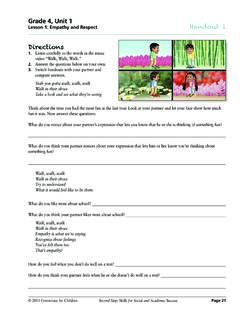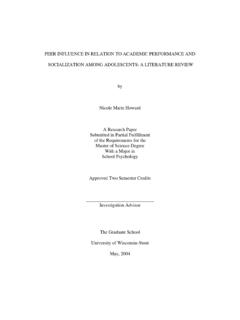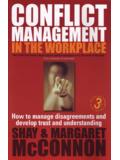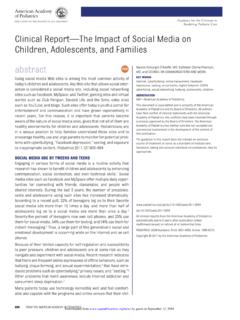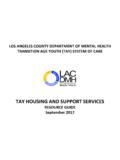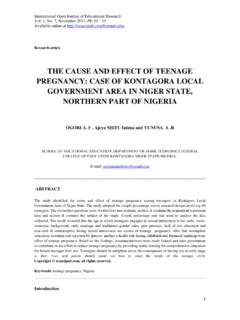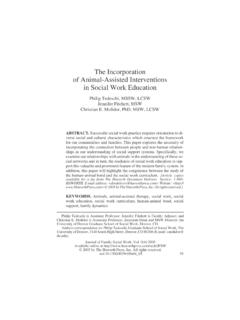Transcription of Kindergarten–Grade 5 Second Step Program Self …
1 2011 Committee for Children Second step : skills for Social and Academic Success Page 1 self -Regulation SkillsSecond step ProgramKindergarten Grade 5 self -Regulation skills and the New Elementary Second step ProgramSocial-Emotional Learning programs WorkWe all want students to succeed in school and in life. Research tells us that socially and emotionally competent students are more likely to experience this The Second step Program for Kindergarten through Grade 5 is a universal, classroom-based Program that promotes the development of students social-emotional competence. A recent meta-analysis found that students participating in such programs showed significant gains in social-emotional learning (SEL) skills , attitudes, and behaviors, as well as academic It also found that school staff were quite successful in delivering SEL This is all great news.
2 It means students participating in a school-based SEL Program have a better chance of experiencing success in school and life. Making Our Program Work BetterA goal for the new K 5 Second step Program was to improve the Program s positive impact on students school success. As we delved further into the research, we found that self -regulation surfaced as being essential in improving students chances for success both academically and It has emerged as one of the main operators behind SEL programs positive influence on academic achievement. And unlike other factors that can influence students success, such as their socio-economic status or IQ, self -regulation skills can be taught!5 self -Regulation and School SuccessWhat is self -regulation, and how does it contribute to students success in school? In a nutshell, self -regulation is the ability to monitor and manage emotions, thoughts, and ,7 It s what helps students focus their attention on a lesson when they may be distracted by noisy classmates, a problem they had at recess, or excitement about an upcoming birthday party.
3 The ability to self -regulate helps students get along better with teachers and other Students with good self -regulation skills get the most out of school, both in terms of academics and social This sets them up for being successful in life. Unfortunately, many kindergarten teachers report that over half their students start school lacking good Students with poor self -regulation have high rates of expulsion from school, especially in preschool They re also at greater risk for low academic achievement, emotional and behavioral problems, peer rejection, and school 15 There s no question that students need to learn to self -regulate in order to avoid these negative outcomes. Teaching self -Regulation SkillsLuckily self -regulation skills can be taught and the new K 5 Second step Program accomplishes this in a number of ways.
4 Brain BuildersFrom Kindergarten through Grade 3, students develop skills foundational to self -regulation via short, five-minute games called Brain Builders. These are specially designed to build the areas of students brains that help them focus their attention, use their memory, and control their behavior skills known together as 2011 Committee for Children Second step : skills for Social and Academic Success Page 2 self -Regulation SkillsSecond step ProgramKindergarten Grade 5executive function skills . Research links these skills to later academic achievement16 21 and also shows that games like Brain Builders can be used successfully to improve students self -regulation 25 In this age range, the parts of students brains that carry out these skills are still developing. So it s the perfect time to challenge directly and provide practice in these skills using the Program s Brain Builder games.
5 skills for LearningThe new K 5 Second step Program further promotes the development of self -regulation skills with its focus on skills for Learning. Students learn four self -regulation skills they need to be successful learners: focusing attention, listening, using self -talk, and being assertive. These skills support school readiness and academic The benefits of the four self -regulatory skills taught in the Program go beyond academics; the skills also support the rest of the Program content by providing a critical foundation for the development of social-emotional Management and Problem SolvingThe new K 5 Second step Program includes a lot of content designed to strengthen students self -regulation, but this is not an entirely new focus for the Program . Emotion management is both a traditional element of the Second step Program and a central component of skills , another traditional Program focus, can also contribute to self -regulation.
6 The lessons in the Problem-Solving Unit reinforce the use of emotion-management skills ; children are taught that when they are having a problem with peers, it is useful first to calm down, and then to apply a set of problem-solving steps. Additionally, in the course of practicing the final problem-solving step , students get practice making realistic plans and checking them against criteria for a good plan. Planning is a useful skill that can help students develop self -regulation and that they can use to handle both regular classroom challenges and problem in LifeStudents with good self -regulation get the most out of school. They can focus on a lesson and participate in classroom activities. They re able to make friends and get along with their peers. They can follow directions and make good choices. This steers students not only toward school success, but also success in life.
7 And that s what we want for all students. References1. Raver, C. C. (2002). Emotions matter: Making the case for the role of young children s emotional development for early school readiness. Social Policy Report, 16(3), 3 18. 2. Durlak, J. A., Weissberg, R. P., Dymnicki, A. B., Taylor, R. D., & Schellinger, D. B. (2011). The impact of enhancing students social and emotional learning: A meta-analysis of school-based universal interventions. Child Development, 82(1), 405 Ibid. 2011 Committee for Children Second step : skills for Social and Academic Success Page 3 self -Regulation SkillsSecond step ProgramKindergarten Grade 54. McClelland, M., Acock, A. C., & Morrison, F. J. (2006). The impact of kindergarten learning-related social skills on academic achievement at the end of elementary school. Early Childhood Research Quarterly, 21, 471 Moffit, T.
8 E., Arsenault, L., Belsky, D., Dickson, N., Hancox, R. J., Harrington, H., et al. (2011). A gradient of childhood self -control predicts health, wealth, and public safety. Proceedings of the National Academy of Sciences, 108(7), 2693 Barkley, R. A. (2004). Attention-deficit/hyperactivity disorder and self -regulation: Taking an evolutionary perspective on executive functioning. In R. F. Baumeister & K. D. Vohs (Eds.), Handbook of self - regulation: Research, theory, and applications (pp. 301 323). New York: Guilford McClelland, M. M., Ponitz, C. C., Messersmith, E. E., & Tominey, S. (2010). self -regulation: The integration of cognition and emotion. In R. Lerner (Series Ed.) & W. Overton (Vol. Ed.), Handbook of lifespan human development, Vol. 4. Cognition, biology, and methods (pp. 509 533). Hoboken, NJ: McKown, C.
9 , Gumbiner, L. M., Russo, N. M., & Lipton, M. (2009). Social-emotional learning skill, self -regulation, and social competence in typically developing and clinic-referred children. Journal of Clinical Child & Adolescent Psychology, 38(6), 858 Barkley, Rimm-Kauffman, S. E., Pianta, R. C., & Cox, M. J. (2000). Teachers judgements of problems in the transition to kindergarten. Early Childhood Research Quarterly, 15(2), 147 166. 11. Gilliam, W., & Shahar, G. (2006). Pre-kindergarten expulsion and suspension: Rates and predictors in one state. Infants and Young Children, 19(3), 228 Duncan, G. J., Dowsett, C. J. Claessens, A., Magnuson, K., Huston, A. C. Klebanov, P., et al. (2007). School readiness and later achievement. Developmental Psychology 43(6), 1428 1446. 13. Eisenberg, N., Fabes, R. A., Guthrie, I. K., & Reiser, M.
10 (2000). Dispositional emotionality and regulation: Their role in predicting quality of social functioning. Journal of Personality and Social Psychology, 78, 136 Shaw, D. S., Gilliom, M., Ingoldsby, E. M., & Nagin, D. S. (2003). Trajectories leading to schoolage conduct problems. Developmental Pscyhology, 39(2), 189 Vitaro, F., Brendgen, M., Larose, S., & Tremblay, R. E. (2005). Kindergarten disruptive behaviors, protective factors, and educational achievement by early adulthood. Journal of Educational Psychology, 97(4), 617 629. 2011 Committee for Children Second step : skills for Social and Academic Success Page 4 self -Regulation SkillsSecond step ProgramKindergarten Grade 516. Duncan et al., Howse, R. B., Lange, G., Farran, D. C., & Boyles, C. D. (2003). Motivation and self -regulation as predictors of achievement in economically disadvantaged young children.




